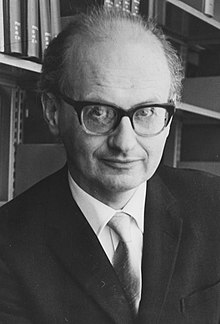
Back Imre Lakatos Afrikaans إمري لاكاتوس Arabic امرى لاكاتوس ARZ Imre Lakatos AST İmre Lakatos Azerbaijani Имре Лакатош Bulgarian Imre Lakatos Catalan Imre Lakatos Czech Imre Lakatos Danish Imre Lakatos German
Preview warning: Page using Template:Infobox philosopher with unknown parameter "influences"
Preview warning: Page using Template:Infobox philosopher with unknown parameter "influenced"
Imre Lakatos (UK: /ˈlækətɒs/,[6] US: /-toʊs/; Hungarian: Lakatos Imre [ˈlɒkɒtoʃ ˈimrɛ]; 9 November 1922 – 2 February 1974) was a Hungarian philosopher of mathematics and science, known for his thesis of the fallibility of mathematics and its "methodology of proofs and refutations" in its pre-axiomatic stages of development, and also for introducing the concept of the "research programme" in his methodology of scientific research programmes.
- ^ a b E. Reck (ed.), The Historical Turn in Analytic Philosophy, Springer, 2016: ch. 4.2.
- ^ Kostas Gavroglu, Yorgos Goudaroulis, P. Nicolacopoulos (eds.), Imre Lakatos and Theories of Scientific Change, Springer, 2012, p. 211.
- ^ Cite error: The named reference
:0was invoked but never defined (see the help page). - ^ K. Gavroglu, Y. Goudaroulis, P. Nicolacopoulos (eds.), Imre Lakatos and Theories of Scientific Change, Springer, 2012, p. 61.
- ^ András Máté (2006). "Árpád Szabó and Imre Lakatos, Or the relation between history and philosophy of mathematics" (PDF). Perspectives on Science. 14 (3): 282–301. doi:10.1162/posc.2006.14.3.282. S2CID 53941387.
- ^ Philosophy of Science: Popper and Lakatos, lecture on the philosophy of science of Karl Popper and Imre Lakatos, delivered to master's students at the University of Sussex in November 2014.
© MMXXIII Rich X Search. We shall prevail. All rights reserved. Rich X Search
